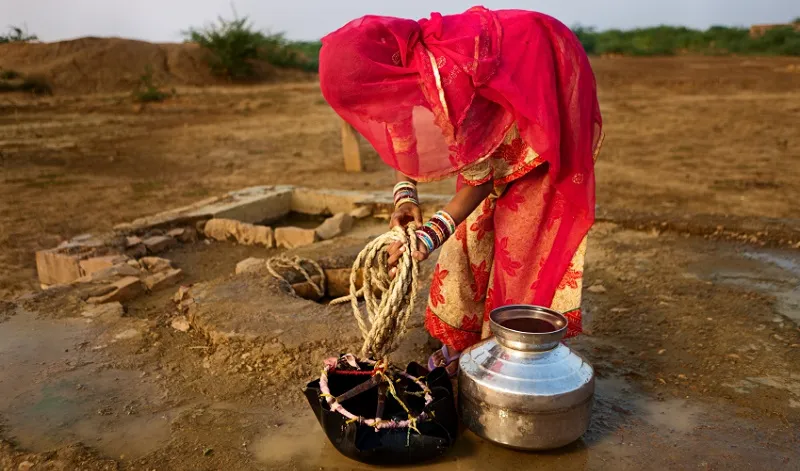Bringing clean and affordable water to rural India – Celebrating three organisations’ novel ideas on World Water Day!
According to World Resources Institute (WRI), over 100 million people in India are living in areas where water is severely polluted. In fact, of the 632 odd districts that were examined for ground water quality, only 59 districts were marked safe. The Government of India estimates that 70 per cent of available water is unfit for consumption without prior treatment. The WRI research also shows that 54 per cent of the nation is facing high to extremely high water stress and this is only bound to get worse.

Lack of safe drinking water poses many health hazards such as diarrhoea and typhoid which saw approximately 7.6 million and 1.09 million registered cases in 2014, respectively. In a quench for clean drinking water, research also indicates that on an average, women and young girls spend 700 hours every year filling and carrying water for home consumption.
As a nation, there’s clearly a lot that needs to be done. But here are three organizations, who are tackling the problem of affordability, accessibility and purity with novel approaches for rural India. On World Water Day (22nd March), let’s celebrate these organizations and inspire many more –
At just Rs 10 per month, people can find out when the NextDrop of water will come

What started as a pilot during an UC-Berkeley project competition in Hubli-Dharwad, inspired Anu Sridharan, who spent all her life in Southern California to shift base to India in 2011. She founded NextDrop – a pioneering solution which taps on the ubiquitous usage of mobile phones. By devising a system that connects local valvemen who measure the water levels in reservoirs on a daily basis and send the information to NextDrop, which in turn sends the information to water engineers who decide the time, location and amount of water to be disbursed every day, NextDrop has created an extremely simple solution – one which surprisingly no one thought of until today.
Once the engineers decide the water flow, they inform the valve men who in turn, send a text message to the customers. And all this costs the beneficiaries, just Rs 10 per month. While the project was initially started in Hubli-Dharwad, it has now spread to Bangalore (charges here are Rs 25 per month) and has over 75, 000 beneficiaries.
Many of these beneficiaries, earlier would spend roughly 50 hours a month waiting for water. Some would even forego an entire day’s work. But Anu’s simple ‘water smart grid lite’ system has changed that. And all it took, was to create a clear communication channel between valvemen, engineers and citizens! Last year, Anu entered the Forbes ’30 under 30′ list as well.
Water ATMs powered by solar energy – Sarvajal, A CSR initiative by Piramal Foundation

Corporate Social Responsibility isn’t merely disbursing money and Piramal Foundation sets a fine example on that, even before the Companies Act 2012 came in to existence.
How can one ensure healthy lives in rural communities if approximately 70 per cent of surface water is contaminated? As an answer to this pressing issue, in 2008, the company founded Sarvajal which translates to ‘Water for All’ with two aims – providing safe drinking water at an affordable price to rural communities and ensuring women folk don’t have to walk long distances in search of water.
The result? A modular RFID (Radio Frequency Identification) controlled standalone water dispensing unit wherein the water is filtered through 5 stages (using reverse osmosis and ultra-violet rays), thus, meeting international water-purification standards. The model operates with the help of local entrepreneurs who run Sarvajal franchisees and sell clean water at an extremely affordable price of just 50 paise/litre and 70 paise/litre if one wants the water to be delivered home. Franchisees pay 40 per cent of their earnings to Piramal Foundation and each unit employs three people, thereby creating indirect employment as well. It currently functions in the scorching lands of Gujarat, Rajasthan, Madhya Pradesh and Uttar Pradesh. There are more than 150 stations which are serving 200, 000, 000 litres of clean drinking water!
There are other players as well such as Eureka Forbes which sets ‘water shops’ to dispense water at as low as 10-50 paise per litre. The company has developed 7 unique technologies which can combat India’s 17 different water conditions. Other companies include Godrej’s solar powered cloud-connected water ATMs, Cairn India’s Jeevan Amrit Project which is a Public-Private Partnership model, to name a few.
Befriending local kiranas to set up water kiosks – Spring Health
In Eastern India, it is estimated that 80 per cent inhabitants lack access to clean drinking water. And the major challenge to even think of a strategy is the fact that each village has no more than 200-300 households. But Spring Health has ambitiously decided to tackle this issue and has set up low-cost safe-water kiosks in Orissa wherein the company uses liquid chlorine to disinfect water at the point of distribution i.e. the local kiranas. Water is sold at 20 paise/litre and delivery to homes costs an additional 10 paise/litre.
The model is currently operational in Khurda, Jajpur, Puri and Dhenkanal districts which cumulatively have over 200 villages.
While these are a mere representative of the multiple ways in which non-profits, social enterprises, multi-national corporates and the government are trying to make clean water accessible, if you do know of a great organization in the water space, give us a shout in the comments section.





![[App Fridays] TikTok lovers, are you ready for Firework, the new short video platform in town?](https://images.yourstory.com/cs/2/a182c7e0140711e987e2f7248b252f46/Firework1571401406063png?mode=crop&crop=faces&ar=1%3A1&format=auto&w=1920&q=75)

